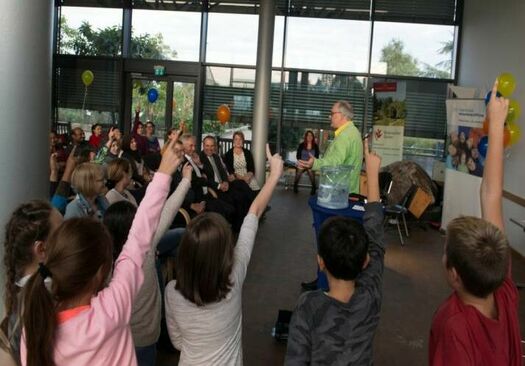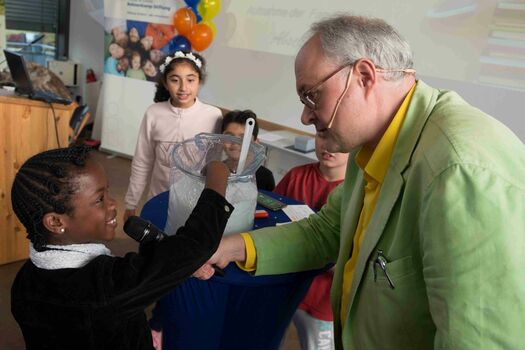"Learning is much better with fun!"


Second year of Diesterweg scholarship celebrates launch with families, city and Bohnenkamp Foundation
Osnabrück, September 21, 2017
That's when the children couldn't keep their seats any longer: When Joachim Hecker demonstrated his experiments, some of the new Diesterweg Fellows got right up front. They didn't want to miss anything when the electrical engineer showed how a water organ works, how artificial snow is made, or how he makes a metal pin beep by grabbing the nose of a boy Berkay Yurtkuran. And quickly their fingers were up when Joachim Hecker asked who would like to help with the next experiment. Hecker delighted more than just his young audience at the second-generation Diesterweg Fellowship's commencement ceremony. "Learning is much better with fun," emphasized Gisela von Auer from the Stiftung Polytechnische Gesellschaft Frankfurt am Main at the beginning. Joachim Hecker's performance proved it.
Ceremoniously, the city and the Friedel & Gisela Bohnenkamp Foundation, together with guests from education, politics and the foundation sector, admitted 17 new families to the Diesterweg Scholarship. This program, developed by the Polytechnic Society Foundation, is aimed at fourth-graders who are unable to fully display their talents for reasons outside of school. "To educate a child, it takes a village - and we are that village," said Michael Prior, considering the numerous cooperation partners who support the program in Osnabrück. The managing director of the Friedel & Gisela Bohnenkamp Foundation brought the Diesterweg Scholarship to the city. It is supported not only by the children's schools, but also by museums and other local educational institutions; one round runs for two years. "I'm happy to be your companion on the way," said Katharina Liebing, the project manager for the scholarship at the City of Osnabrück.
At the admission party, Liebing and Prior made a bet: "We'll manage at least 50 percent," Liebing said regarding the wishes the children formulated for the two years. Some want to learn an instrument like piano or drums, others want to be able to do gymnastics, Delia Comann wants to learn how to make her own chocolate, and Hala Sos wants to ride a horse. But there are also bigger wishes, such as going on a trip around the world. Michael Prior countered and challenged Katharina Liebing: "If we can do that, I'll order an ice cream truck for the graduation party," he said to the children's applause.
At the reception party, not only were the admitted boys and girls presented with their families. There was also a supporting program. This included Joachim Hecker, but also Natalia Vanishvili and Edin Mujkanovic, who as Duo Marili presented songs from Georgia and Macedonia with vocals and guitar. A delicious buffet at the end of the festival was provided by Kardalo.
In 2008, the Diesterweg scholarship was offered for the first time in Frankfurt am Main, Gisela von Auer told: "In the meantime, 450 families nationwide belong to it with more than 2000 people." The first Diesterweg children graduated from high school this spring. Its success, she said, is reflected not only in the successful educational biographies of the sponsored children, but also in the fact that nine other cities are implementing the scholarship, including Hamburg, Hanover, Darmstadt and Duisburg.
Borys Jastrzebski is now also a Diesterweg scholarship holder. He describes himself this way: "I'm a bit like a volcano. I have lava of ideas inside me." Over the next two years, he can let this idea lava flow with the other scholarship holders at academy days on various topics, such as natural sciences, music, language, literature, theater and art. They are just as much a part of the program as excursions to Osnabrück and the surrounding area, as well as vacation courses. Financial assistance is also available for the purchase of educational materials. At the same time, parents are encouraged to provide even better support for their children. This also applies to the transition to secondary school.
To be included in the scholarship, children must be nominated by their teachers. Subsequently, 23 families were invited to a selection interview, and 17 received an acceptance. The seriousness of the support was sealed with a cooperation agreement between the Bohnenkamp Foundation and the city on the one hand and the families on the other. Gisela von Auer thanked Michael Prior during the admission ceremony for the good cooperation. She presented him with a certificate and a bust of Adolf Diesterweg.